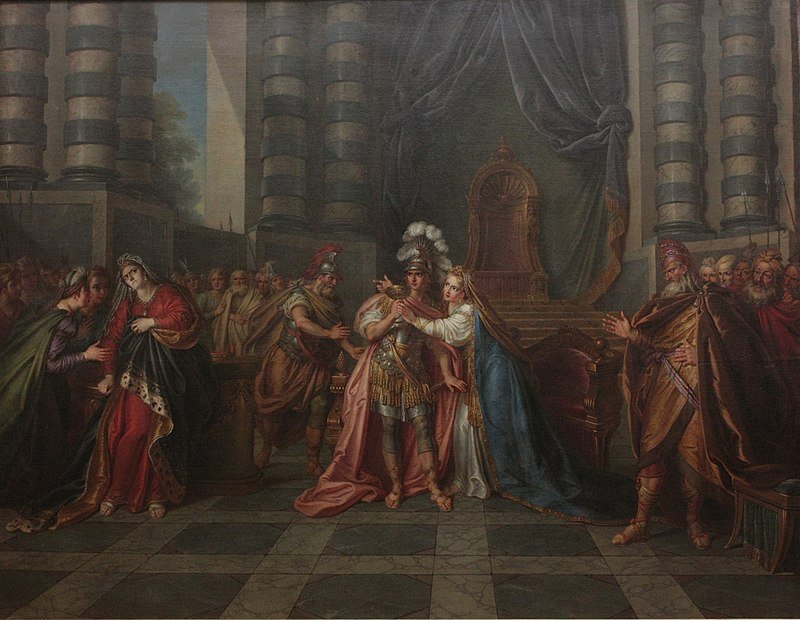Rhodogune Of Parthia Refused To Bath And Comb Her Hair Until She Subdued The Rebels
Ellen Lloyd - AncientPages.com - Some people are so dedicated to a cause that they can do things most of us consider incredible. When Rhodogune of Parthia learned about an uprising she refused to bathe and comb her hair until she had subdued the rebels. Fortunately for her, she accomplished what she wanted in a short time.
Rhodogune was the daughter of the Parthian king Mithridates I (171 B.C, -132 B.C.), and sister of Phraates II who ruled between 132 B.C. and -127 B.C.
Anachronistic painting of Rhodogune with Cleopatra II of Egypt by the 18th-century French painter Charles-Antoine Coypel. The Seleucid ruler Antiochus VIII Grypus is to the far right. Credit: Public Domain
As the wife of Seleucid king Demetrius II Nicator she lived with her husband and their children in Hyrcania on the shores of the Caspian sea. Hyrcania which means "Wolf-land", bordered Parthia to the East, and after the Sasanian Empire in 651 AD, Hyrcania was known as Tabaristan.
Life changed dramatically for Rhodogune during the invasion of Parthia by Demetrius' brother, Antiochus VII Sidetes. After an ill-fated campaign in Babylonia, her husband tried to on several occasions to escape from Parthia, but he failed.
The Parthians established an empire that lasted almost 500 years, from the mid-3rd century BC until 224 CE. Their empire was the most lasting of the empires of the ancient Near East.
They came to power under king Mithradates the Great (171-138 BC); their territories stretched from the Euphrates River in the west to Central Asia and the borders of Bactria in the east. The Parthian empire occupied Iraq, Armenia, all of modern Iran, parts of Turkey, Georgia, Azerbaijan, Turkmenistan, Afghanistan, and Tajikistan, and for short time, also territories in Pakistan, Syria, Lebanon, Israel, and Palestine.
Strangely, despite their enormous role in forming a strong link between the peoples of East Asia and Europe - the Parthians were overshadowed by the Achaemenids and Sassanids.
In 200 B.C. Rhodogune “got word of a revolt when she was taking a bath. Vowing to end the uprising before her hair was dressed, she hopped on her horse and rushed to lead her army to defense. True to her word, she directed the entire, lengthy war without ever bathing or combing her hair. Portraits of Rhodogune al-ways faithfully depict her dishevelment.” 1
According to Aeschines, (390 B.C. - 314 B.C) orator and statesman of Athens, Rhodogune, queen of the Persians “made the Persian kingdom most powerful. For she was, he says, so brave in her deeds and frightening that once, while in midst of arranging her hair, she heard that several tribes had rebelled, She left her hair semi-braided and did not braid if until she had captured and subdued the aforementioned tribes. That is why a golden statue of her was dedicated, with haft her hair braided round her head and other half hanging loose.” 2
Rhodogune Of Parthia is one of many ancient women who accomplished something that changed history and yet, there is so little historical information about her.
Written by - Ellen Lloyd – AncientPages.com
Copyright © AncientPages.com All rights reserved. This material may not be published, broadcast, rewritten or redistributed in whole or part without the express written permission of AncientPages.com
Expand for referencesMore From Ancient Pages
-
 Salzburg Catacombs: Early Christian Place For Secret Gatherings And Hiding From Persecution
Featured Stories | Mar 16, 2016
Salzburg Catacombs: Early Christian Place For Secret Gatherings And Hiding From Persecution
Featured Stories | Mar 16, 2016 -
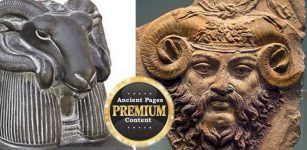 The Enigma Of People And Gods With Horns In Ancient Times
Featured Stories | Nov 7, 2015
The Enigma Of People And Gods With Horns In Ancient Times
Featured Stories | Nov 7, 2015 -
![Microscopy picture of a dividing basal radial glial cell, a progenitor cell type that generates neurons during brain development. Modern human TKTL1, but not Neandertal TKTL1, increases basal radial glia and neuron abundance. Credit: Pinson et al., Science 2022 / MPI-CBG Left: Microscopy picture of a dividing basal radial glial cell, a progenitor cell type that generates neurons during brain development. Modern human TKTL1, but not Neandertal TKTL1, increases basal radial glia and neuron abundance. [less] © Pinson et al., Science 2022 / MPI-CBG; Right: Anneline Pinson is a researcher in Wieland Huttner's group. © MPI-CBG](https://www.ancientpages.com/wp-content/uploads/2022/09/Brain12Neurons-307x150.jpg) Modern Humans Generate More Brain Neurons Than Neandertals
Human Beginnings | Sep 8, 2022
Modern Humans Generate More Brain Neurons Than Neandertals
Human Beginnings | Sep 8, 2022 -
 Discovery Of Half-Million-Year-Old Wooden Structure Shows We’re Wrong To Underestimate Our Ancient Relatives
Featured Stories | Oct 10, 2023
Discovery Of Half-Million-Year-Old Wooden Structure Shows We’re Wrong To Underestimate Our Ancient Relatives
Featured Stories | Oct 10, 2023 -
 Mystery Of Monte d’Accoddi: Was It An Ancient Step Pyramid, Altar Or Astronomical Observatory?
Civilizations | May 17, 2016
Mystery Of Monte d’Accoddi: Was It An Ancient Step Pyramid, Altar Or Astronomical Observatory?
Civilizations | May 17, 2016 -
 Pyla-Koutsopetria: Complexity Of Ancient Fortifications Of Pyla-Vigla, Cyprus – Explored
Archaeology | Oct 15, 2019
Pyla-Koutsopetria: Complexity Of Ancient Fortifications Of Pyla-Vigla, Cyprus – Explored
Archaeology | Oct 15, 2019 -
 Evidence Of Unusual Solar Activity Discovered On Ancient Cuneiform Tablets
Archaeology | Oct 16, 2019
Evidence Of Unusual Solar Activity Discovered On Ancient Cuneiform Tablets
Archaeology | Oct 16, 2019 -
 Mysterious Ancient Underwater Structure Beneath MacDonald Lake Reveals Traces Of A Lost Civilization In Ontario
Civilizations | Nov 15, 2018
Mysterious Ancient Underwater Structure Beneath MacDonald Lake Reveals Traces Of A Lost Civilization In Ontario
Civilizations | Nov 15, 2018 -
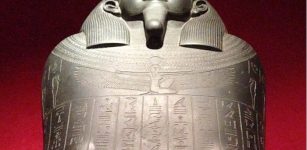 King Tabnit’s Sarcophagus And Its Surprising Forever-Lost Secret
Featured Stories | Jul 30, 2023
King Tabnit’s Sarcophagus And Its Surprising Forever-Lost Secret
Featured Stories | Jul 30, 2023 -
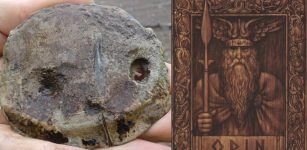 Unusual Object With Crosses And Enigmatic Runes Discovered In Sweden
Archaeology | May 16, 2018
Unusual Object With Crosses And Enigmatic Runes Discovered In Sweden
Archaeology | May 16, 2018 -
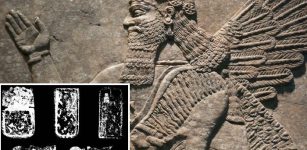 Aluminum Was Used At Least 7,000 Years Ago – Long Before The Metal’s Official Invention In 1825
Ancient Technology | Jul 10, 2017
Aluminum Was Used At Least 7,000 Years Ago – Long Before The Metal’s Official Invention In 1825
Ancient Technology | Jul 10, 2017 -
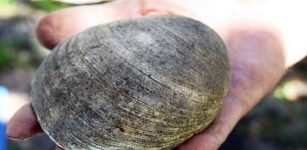 Manasota People: Will 1,300-year-Old Village Tell Us About Their Lives?
Archaeology | Jan 11, 2016
Manasota People: Will 1,300-year-Old Village Tell Us About Their Lives?
Archaeology | Jan 11, 2016 -
 Leonardo Da Vinci Has 14 Living Male Descendants – DNA Study Reveals
Archaeology | Jul 7, 2021
Leonardo Da Vinci Has 14 Living Male Descendants – DNA Study Reveals
Archaeology | Jul 7, 2021 -
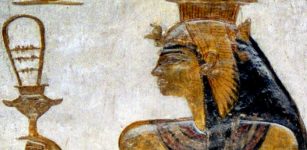 Sistrum: A Magical, Sacred Ancient Egyptian Musical Object
Civilizations | Dec 31, 2014
Sistrum: A Magical, Sacred Ancient Egyptian Musical Object
Civilizations | Dec 31, 2014 -
 Mysterious 3,200-Year-Old Hittite Map Of The Cosmos And The 12 Gods
Archaeoastronomy | Jul 2, 2021
Mysterious 3,200-Year-Old Hittite Map Of The Cosmos And The 12 Gods
Archaeoastronomy | Jul 2, 2021 -
 Puzzling Evidence Of An Advanced Ancient Civilization In Texas That Mysteriously Disappeared
Civilizations | Apr 9, 2018
Puzzling Evidence Of An Advanced Ancient Civilization In Texas That Mysteriously Disappeared
Civilizations | Apr 9, 2018 -
 Krampus Celebrations Are Becoming Dangerous – Historian Warns
Ancient Traditions And Customs | Dec 10, 2019
Krampus Celebrations Are Becoming Dangerous – Historian Warns
Ancient Traditions And Customs | Dec 10, 2019 -
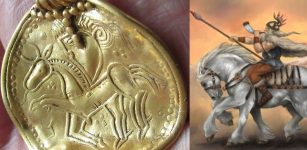 Discovered Gold Pendant Of Odin And His Horse Sleipnir Might Be Linked To The Heruli Tribe
Archaeology | Apr 16, 2016
Discovered Gold Pendant Of Odin And His Horse Sleipnir Might Be Linked To The Heruli Tribe
Archaeology | Apr 16, 2016 -
 Dozens Of Giant ‘Lost’ Nazca Geoglyphs Unearthed By Drones In Peru
Archaeology | Apr 7, 2018
Dozens Of Giant ‘Lost’ Nazca Geoglyphs Unearthed By Drones In Peru
Archaeology | Apr 7, 2018 -
 Pyramid Of The Moon And Avenue Of The Dead Could Be Foundation For Urban Design Of Teotihuacan
Archaeology | Jul 31, 2020
Pyramid Of The Moon And Avenue Of The Dead Could Be Foundation For Urban Design Of Teotihuacan
Archaeology | Jul 31, 2020

